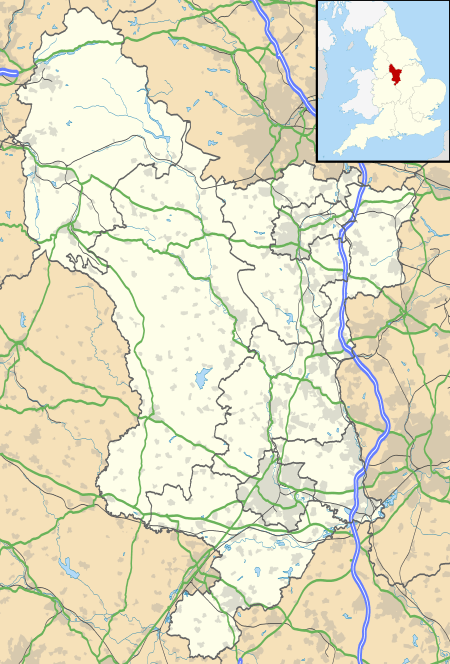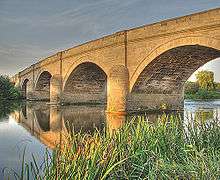Swarkestone
Swarkestone is a village and civil parish in the South Derbyshire district of Derbyshire, England. The population at the 2011 Census was 187.[1]
| Swarkestone | |
|---|---|
 Swarkestone Location within Derbyshire | |
| Population | 187 (2011) |
| OS grid reference | SK372286 |
| District | |
| Shire county | |
| Region | |
| Country | England |
| Sovereign state | United Kingdom |
| Post town | DERBY |
| Postcode district | DE73 |
| Dialling code | 01332 |
| Police | Derbyshire |
| Fire | Derbyshire |
| Ambulance | East Midlands |
| UK Parliament | |
Swarkestone has a very old village church, a full cricket pitch, a plant nursery/ garden centre and restaurant called "Swarkestone Nursery", the Crewe and Harpur pub, a canal with a Georgian lock keepers cottage and moorings. It was mentioned twice in Domesday as Sorchestun or Suerchestune, when it was worth twenty shillings.[2]
Swarkestone Bridge

The ancient bridge at Swarkestone crosses the River Trent about 6 miles south of Derby and was for about 300 years the Midlands' main crossing of the Trent. The only crossing between Burton Upon Trent and Nottingham,[3] it is currently Grade I Listed and a Scheduled Ancient Monument.
History
Swarkestone bridge was built in the 13th century to cross the river and its surrounding marshes, between the villages of Swarkstone and Stanton by Bridge.[4] It was financed by the two 'Bellamont sisters. Both had become engaged and were to throw a joint celebration; their fiancés, however, had to meet the local barons on the far side of the river.[3] Following a storm the Trent became swollen; eager to return to their brides-to-be and their party, the men tried to ford the river on horseback: both were swept away and drowned.[3] The Bellamont sisters commissioned the bridge so that no one else would suffer the tragedy they had.[3] Neither sister married and both died in poverty having exhausted their fortune on building the bridge.[3]
Swarkstone bridge is three quarters of a mile long[4] and has 17 arches. It is the longest stone bridge in England, and the longest inland bridge in England.
In 1745, Swarkstone Bridge was the furthest point South Bonny Prince Charlie, and his troops, got in his attempt to reclaim the British Throne.
According to Pevsner, the present part actually crossing the river, which has 5 arches, dates from the 18th century and was designed by Thomas Harrison.[5] Substantial work was carried out in 1795–1797 by Thomas Sykes, County Surveyor of Bridges for Derbyshire, at a cost of £3,550.
The bridge today
The bridge is undersized for modern traffic and is scarcely two-lane for cars at several points. Though there is a weight limit of 7.5 tonnes, the walls of the bridge often take damage from traffic.
Local legends
The bridge is subject to several local legends. It is supposed to be haunted by the ghosts of the two Bellamont Sisters that constructed the bridge.[3] Others have alleged the bridge is haunted by Bonny Prince Charlie's troops.[3]
The most commonly reported phenomenon is the sound of horses approaching at speed when there is nothing about.[3]
The bridge is also subject to a local legend which says that the river must claim 3 lives every year in order for it to be 'pacified'.[3] The bridge is a local accident black-spot, with 15 reported road-traffic accidents between 2008 and 2010.[6]
History
Evidence of the Beaker people living near Swarkestone was discovered in the 1950s. At that time it was estimated that people had lived near Swarkestone for at least 3,800 years.[7] The only surviving Bronze Age barrow cemetery in the Trent valley is at Swarkestone Lows near the A50. The barrow is a registered national monument.[8]
In the Domesday Book, Swarkestone was held by the King (William the conqueror) and by Henry de Ferrers.[2]
In the Battle of Swarkestone Bridge during the English Civil War (1643) it was defended by the Royalists against the Parliamentarians, but the outnumbered Cavaliers lost the day.
In 1745 during the Jacobite rising led by Bonnie Prince Charlie, the advance party of his army reached here to gain control of the crossing of the Trent. Finding no reports of support from the south, they turned back to Derby; the invading army then retreated to Scotland and final defeat at the Battle of Culloden. Swarkestone thereby being the most southerly point reached during that army's advance on London.
Sport
Swarkestone Cricket Club gained promotion to the Derbyshire Premier Cricket League in 2011, finished second in the subsequent year and won the Premier League in the 2013 season.
The Pavilion
Nearby is the Jacobean grandstand called Swarkestone Hall Pavilion and walled area, formerly connected with Harpur Hall, where (it is believed, see Pevsner, loc. cit.), they used to bait bulls. The pavilion is attributed to John Smythson who also designed Bolsover Castle, and is Grade I Listed.[9] It was repaired and is now owned by the Landmark Trust who maintain it and rent it out to holidaymakers.
Images
 Swarkestone Lock and Keeper's House
Swarkestone Lock and Keeper's House St James’ Church, Swarkestone
St James’ Church, Swarkestone- Swarkestone Lowes
Notable residents
- Thomas Bancroft, poet, was born here in the early 17th century.[10]
See also
The chain ferry at Twyford was the next crossing north of the Swarkestone Bridge.
References
- "Civil Parish population 2011". Neighbourhood Statistics. Office for National Statistics. Retrieved 31 March 2016.
- Domesday Book: A Complete Translation. London: Penguin, 2003. ISBN 0-14-143994-7 p.742 & 749
- Wadd, Barbara (2007). More Ghost Walks in Derbyshire. Wiltshire: Cromwell Press. ISBN 978-1-85983-556-2.
- Historic England. "Swarkestone Bridge and Causeway (1088337)". National Heritage List for England. Retrieved 7 September 2014.
- Pevsner N, The Buildings of England . Derbyshire 2nd edition revised (1978) by Elizabeth Williamson, Penguin Books. 'Swarkeston', p.337
- A CAR that caused a fatal crash on Swarkestone Bridge should not have been on the road, according to a police vehicle examiner. | This is Derbyshire
- Beaker Folk site found in Britain New York Times December 1956
- Historic England. "Lows Barrow (1019060)". National Heritage List for England. Retrieved 7 September 2014.
- Landmark Trust – Swarkestone Pavilion
- Thomas Bancroft in the Dictionary of National Biography
External links
| Wikimedia Commons has media related to Swarkestone. |
- Swarkestone in the Domesday Book
- Swarkestone: historical and genealogical information at GENUKI.